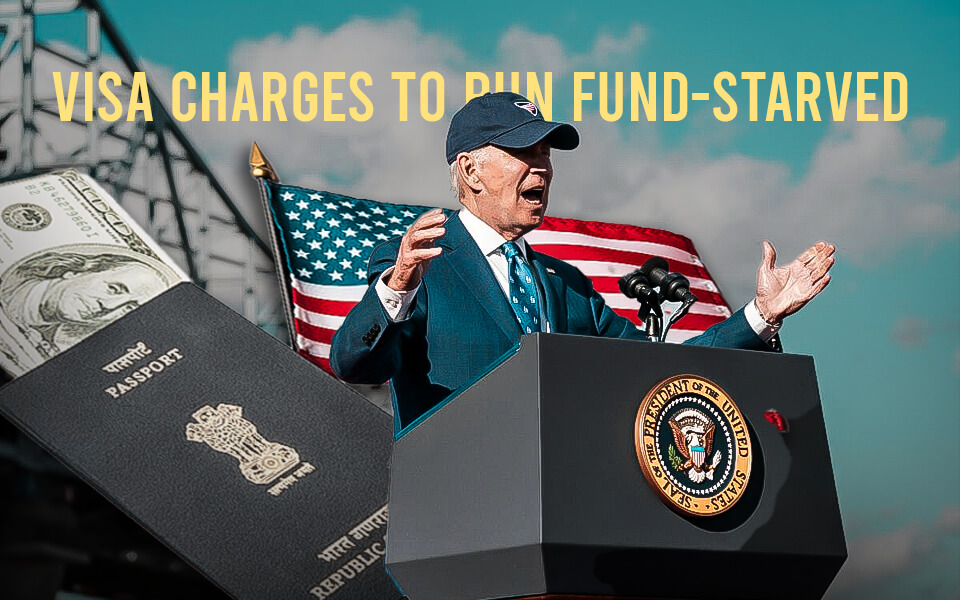US May Hike H1-B Visa Charges to Run Fund-Starved Immigration Body
Key Takeaways:
- The Federal law usually prohibits an employer from requiring that an employee pay for or compensate the employer’s expenses for U.S. Citizenship and Immigration Services’ (USCIS) filing fees or attorneys’ fees associated with preparing or filing an H-1B petition.
- There are two types of H-1B processing procedures: regular and premium. With regular processing, depending on the case and location, it usually takes USCIS between three and four months to reach a decision.
- Premium processing requires an extra $1,225 and ensures USCIS adjudicates the application within 15 days of receiving it.
- USCIS has taken out a notice stating that there could be a hike in the H1-B pre-registration fees to $215 from $10.
The H1-B visa is a work visa given to people intending to work in the US. It is the employer who sponsors the said visa. The application process entails the payment of fees at the last stage.
After completing the H-1B application process and before submitting the petition to U.S. Citizenship and Immigration Services (USCIS), one must get the fees in order. Otherwise, the H-1B application may be denied.
There is a wide range of stipulations under this broad visa spectrum. Understanding the correct channel to utilize is possible with the help of more research and inquiry.
The sponsorship fee details and the exemption sections are thoroughly detailed on the official website. Immigration agents are also stationed who provide help to those who require it.
USCIS has taken out a notice stating that there could be a hike in the H1-B pre-registration fees to $215 from $10.
The current immigration operations and the global backlog of visa processing have resulted in this proposed hike for specific visa categories.
If and when this move is approved, it could change the landscape of American and Indian technology firms.
The other outcome of the proposed, approved plan would be the hike in the petition fees to about 70%. In addition, the L1 visa for intra-firm transfer would rise by 201%.
The paperwork for the persons filling out the application forms would also increase. There are already detailed forms and subsections for each visa category. Therefore, it could become more cumbersome and time-consuming for an individual.
The breakup of the filing fees are as follows:
a. Base Filing Fee
b. Fraud Prevention and Detection fee
c. Employer sponsorship fee- exemptions for certain specified cases.
d. Public law 114-113 fee- exemptions for certain selected circumstances.
e. Premium processing fee- Only on Request.
The employer is referred to as the petitioner, and the employee is the beneficiary. Once integrated into the workforce, the knowledge and the action set would improve.
Filing a Form I-129 and I-140 petition could fall within the proposal of a $600 ‘Asylum Program Fee.’ The employer would bear this cost. This could also substantially hike the visa cost.
Form I-129 is for non-immigrant employment petitions such as the H-1B. The I-140 is for an employer-sponsored green card.
Employees going through this process for the first time have it less complicated. The employer would have to pay the base filing fee, the fraud detection amount, and the employer sponsorship fee, if applicable.
An illustration of the visa fees will make it easier to understand:
Background
X is a current H-1B beneficiary who’s in the process of changing his employer. His new boss, Y, is a small start-up company with ten(10) employees.
The correct filing fees-
As the petitioner, Y has to pay the following filing fees for the H-1B transfer petition: $460 (base filing fee), $500 (fraud detection), and $750 (employer sponsorship fee for companies with 25 or fewer employees).
Therefore, the total fee for this H-1B transfer is $1,710.
A report states because of COVID-19-related closure and staffing limitations, as well as the continued effect of the 2017 travel bans, processing green cards up to the annual cap has been complex.
It recommends that the Department of State’s National Visa Center (NVC) facility hire additional officers to increase capacity to process Green Card application interviews by 100% in three months from August 2022.
It allows for an increase in Green Card applications and visa interviews, judicially settling the decisions by 150% up till August 2023.
Keeping track of all the forms one submits, and the fees to pay could be difficult. However, the USCIS I-129 Fee Page has the most up-to-date information about filing fees for the H-1 visa.
Nonetheless, it would be more convenient to have an earnest legal expert to guide you through the process.







